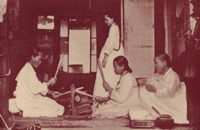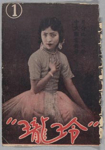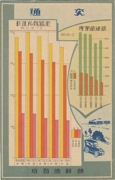Elvin’s The Retreat of the Elephants has a section on dragons. Specifically, why reliable, skeptical observers like Xie Zhaozhe, who published his Fivefold Miscallany in 1603 claimed to have seen them. That people should believe that dragons existed is of course not surprising. I believe in Australia despite the fact that I’ve never seen it and at lest half the stories about it are obvious fantasies. Xie was a good skeptical observer. His work on a local gazetteer convinced him that historical records were problematic, he was skeptical of dream visions and felt that heavenly portents were more likely “a literary artifice used by historians [to convey their disapproval of the emperor’s confidants]” then a sign of heavenly displeasure.
On the other hand he himself had seen a dragon
I journeyed in 1579 with my paternal grandfather,…when he was in charge of the official travel arrangements [for the commissioner to the Liuqiu Islands]. We were halfway there when a typhoon arose. Thunder, lightning rain and hailstones all fell on us at the same time. There were three dragons suspended upside down to the fore and aft of the ship. Their whiskers were interwound with the waters of the sea and penetrated the clouds. All the horns on their heads were visible, but below their waists nothing could be seen. Those in the ship were in a state of agitation and without any plan of action, but an old man said: “This is no more than the dragons coming to pay court to the commissioner’s document bearing the imperial seal.” He made those attending the envoy have the latter write a document in his own hand bringing the court audience to an end. The dragons complied with the time so indicated and withdrew. That the authority of the Son of Heaven is effective over the manifold spirits is a principle about which there can assuredly be no doubt. If I had not witnessed this event personally, it is unlikely that I would not have considered this principle to be false.
How to explain this? More broadly, how does one explain China’s non-transition from pseudo-science (defined as a systematic collection and organization of data that somehow does not rise to the level of science) to real science? Neither Elvin or I am particularly interested in the old “why is China not like the West” questions, but I found this section of his book very interesting in that it explains the concepts behind Chinese thinking about the natural world
Many Chinese observers tried to fit phenomenon into the Five Elements theory, which Xie has no use for. Although he was convinced that Heaven was conscious and had moral concerns, he was not convinced that these could be fully understood. Although he praised the calendrical experts Luoxia Hong and Yixing for thinking “deeply about the numbers that express what is of the essence” he also scoffed at the Song Neo-Confucian efforts to explain the entire universe in terms of pattern-principle (li). Some things were beyond comprehension.
According to Elvin
“Each phenomenon possessed a distinctive pattern-principle of its own, which was conceptually atomic. In other words, it was intuitively understandable only as a whole and not in terms of any constituent parts. It was also operationally monadic in the sense that it did not interlock structurally with other pattern-principles in any exact sense…..these two properties of pattern-principle, namely conceptual atomism and operational monadism, were obstacles that prevented the scrutiny of pattern-principle from giving rise to a process of analysis with enough momentum to lead in the direction of modern styles of scientific thinking.”
Elvin goes on to point out that what was lacking in China was not observers but ‘facts’ a cultural construct that was “a publicly recorded and accessible statement about an observable aspect of the world, set in the context of a systematic evaluation of the evidence that that yields an approximate probability of its being true, and subject to a continuing public scrutiny and re-evaluation, with the results and the evidence being publicly recorded and accessible. ”
As Elvin points out there was a context in which the creation and exchange of knowledge in China did lead to something like modern science facts, which is the case of textual studies, as discussed by Benjamin Elman. Why the difference? I would suggest that part of it is a different idea of Heaven. I once heard a paper by Chen Wei-chi where he talked about George McKay, a missionary/naturalist who did a lot of work on the flora and fauna of Taiwan. For McKay the naming and categorizing of things was part of uncovering God’s plan, and uncovering things in Taiwan was part of bringing the island into a Christian and scientific world.
Unlike Xie’s li and qi, which simultaneously explained “too much and too little”, the western conceit of a creator God who has a plan encourages systematic and collaborative attempts to figure out what that plan it. In the case of classical philology in China it was universally assumed that there had once been a true and authentic version of the classics which had been lost and could be recovered, and it was a Good Thing to contribute to this cause. Natural science was not the same, because the only possible final destinations were 5 Elements, which did not work, or a random hodge-podge of interesting but useless data. Initial assumptions seem to matter a lot.
Wei-chi Chen, “The Natural History of Formosa is as yet an Unwritten Book: George Mackay, a Missionary Naturalist in Taiwan, 1872-1901” Paper presented at MARAAS 2001, Slippery Rock PA



